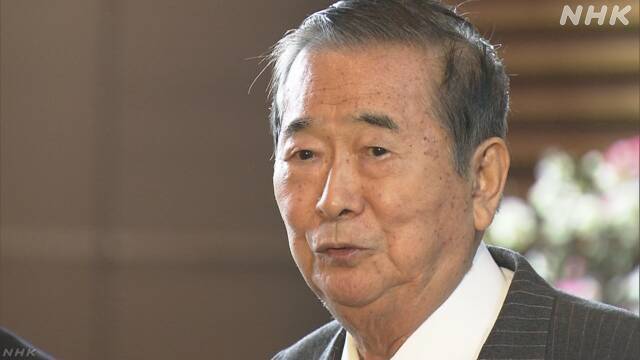
Image via NHK
The
Japanese media outlets The Japan Times and NHK have reported that former Tokyo Governor Shintaro Ishihara passed away today at the age of 89. Ishihara was best known in the anime and manga community as the figure spearheading the revision of Tokyo & # 039; s Youth Ordinance Bill in the early 2010s to also include the sale and rental of manga, anime, and photographs, which saw wide backlash in the industry with 900 manga artists signing their disagreement with the revision.
The
Shintaro Ishihara was born on September 30, 1933, and rose to prominence as the author of the award-winning 1955 book Season of the Sun, which was adapted into a film that starred his brother Yujiro IshiharaIn the 50s and 60s, Ishihara directed and wrote a range of films and books until he was contracted by the conservative Yomiuri Shimbun paper to cover the Vietnam War, which prompted him to get into politics.
The
After a failed run at becoming the Tokyo Governor in 1975, Ishihara worked his way up through the Liberal Democratic Parties ranks, challenging for the party head in 1989 and losing. In 1995, Ishihara left the right-wing LDP to go independent and run again for the Governor of Tokyo, which he won in 1999.
The
Ishihara was a controversial figure during his tenure as the Governor of Tokyo. He was known to use the term Thesangokujin (literally translated to third-world nationals) to refer to people from South Korea and Taiwan, was critical of the US-Japan alliance, calling Japan "a country that can & # 039; t assert itself," called homosexuality abnormal, dismissed the Rape of Nanking as fictional, called westerners who practiced judo "beasts," and commented that those who were affected by the 2011 Tohoku earthquake were "pitiful," and the event "divine punishment" against Japan & # 039; s "egoism," though he later apologized for those remarks.
The
As Governor of Tokyo, Ishihara passed The bill restricts the sale of publications that "unjustifiably glorifies or exaggerates" sexual and pseudo-sexual acts on minors. , as well as regulate images that may be "considered to be excessively disrupting of social order." The revisions drew widespread condemnation in the industry with then Shueisha editor Kazuhiko Torishima saying, “I want new manga authors to produce manga that would blow away Shintaro Ishihara. ”
The
Even then-Japanese Prime Minister Naoko Kan was was hesitant of the bill, saying "Healthy development of youth is an important issue. At the same time, it is important that Japanese animation is broadcast to a global audience."
The
It all came to a head when a large number of anime and manga companies, including Aniplex, Kadokawa, Kodansha, Shueisha, and more announced announced they would boycott the 2011 Tokyo International Anime Fair, instead putting on their own event in the neighboring prefecture of Chiba. The Anime Contents Expo was set to be held on March 26 and 27, which was set to be the last day of that year & # 039; s Tokyo International Anime Fair, though the then-Kadokawa Shoten president called it a "coincidence." Both events were canceled due to the March 11, 2011, Tohoku Earthquake and Tsunami. Anime Contents Expo had its first event in 2012 and last event in 2013, where it was merged into the Tokyo International Anime Fair and formed AnimeJapan, which runs to this day. Ishihara & # 039; s governorship ended in October 2012.
The
Ishihara also spearheaded Tokyo & # 039; s bid for the 2016 Olympic Games, which they lost, though were successful in their bid for the 2020 games, which was held in Tokyo in 2021 due to the COVID-19 pandemic.
The
Source: The Japan Times,, NHK
The
![]()
—-
Daryl Harding is a Japan Correspondent for Crunchyroll News. He also runs a YouTube channel about Japan stuff called TheDoctorDazza, tweets at @DoctorDazza, And posts photos of his travels on Instagram.
Leave a comment
You must be logged in to post a comment.